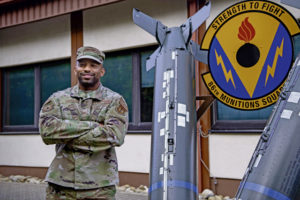
Even though he didn’t grow up in a military family, U.S. Air Force Staff Sgt. Torrey Payne, 86th Munition Squadron stockpile management crew chief, knew he would join the military one day.
“I was always interested in joining as a child,” Payne said. “I got to college and I didn’t see a future in my major. So I decided to leave.”
Payne left college for spring break, but unlike his peers, he didn’t return to class the following week. After a few months, he decided to meet with a recruiter to start his Air Force career.
“I didn’t have a job in mind when I joined the Air Force; I just wanted to join,” Payne said. “I just knew I wanted to do something else with my life, so finding out I was going to work with explosives was something I never anticipated.”
The 86th MUNS Airmen are responsible for building aircraft munitions and conducting testing for munitions and countermeasures. A technician’s job is to ensure serviceability for all munitions, from small arms for security forces to explosives for explosive ordnance disposal technicians.
Five years into his career, 86th Airlift Wing leadership recognized Payne as Airlifter of the Week for his skills, experiences and achievements as a munitions systems technician.
Payne is responsible for leading maintenance crews to sustain war reserve materiel, a collection of warfighting material held in reserve in pre-positioned storage to be used if needed in wartime, and current operations munitions stockpiles valued at $743 million. In addition, he was instrumental during a 12-month $2.2 million facility modernization project.
“Staff Sgt. Payne took on a role that is usually a technical sergeant’s,” Tech. Sgt. Aubrey Thrower, 86 MUNS stockpile management production supervisor, said. “He learned how to account for personnel safety, explosive safety and compatibility limits. There is no one with better working knowledge than he has.”
Payne and his team have planned and moved over 98,000 munitions over the past seven months while adhering to stringent accountability and safety requirements.
“I’ve been able to build a trust-based relationship with my team because I believe you’re only as strong as your team,” Payne said. “We can’t do any part of our job alone, so it is important to establish that trust.”
According to Payne’s leadership, he was a key leader during the squadron’s Theater Integrated Combat Munitions System labeling project.
“Staff Sgt. Payne has a level of rapport that is rare,” Thrower said. “He garners and grants trust and doesn’t hide behind rank. The willingness the Airmen give him their trust is incredible. It’d be underselling to say I’m proud of him. When he is a technical or master sergeant, the people under him will be better because of his leadership.”


